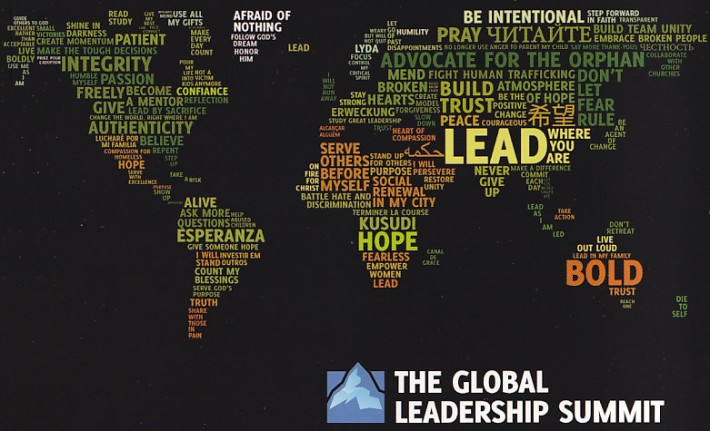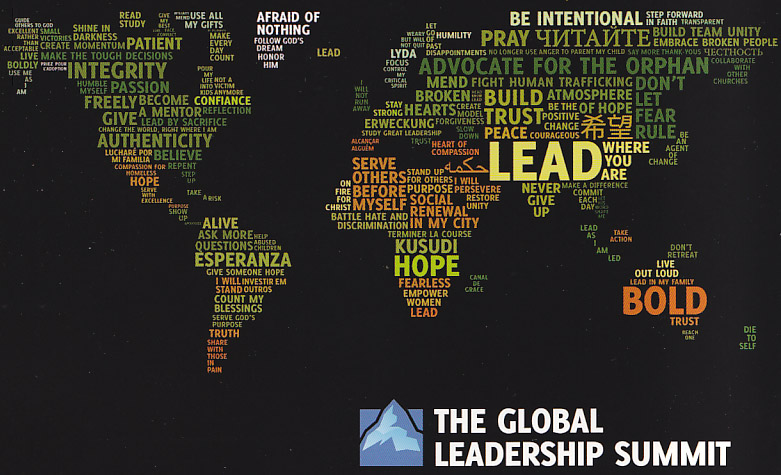A brief summary of the 2011 Willow Creek Global Leadership Summit
This year’s leadership words are humility and vulnerability. I leave the conference with questions as to how these concepts fit in our demanding commercial world, or if the expressions are only suited for intentionally addressing a broken world. I have the next twelve months before the next session to find answers.

Why I attend
Although the two-day Global Leadership conference attracts a wide range of delegates, most watching the re-broadcasted event come from professions aligned with the conference’s faith-based foundations. I suspect managers of digital agencies may be limited to a handful of the conference’s global participants.
My attendance is similar in nature to my choice of academic pursuit. In my Masters of Applied Social Science classes, I sit side by side with human resource professionals and counselling practitioners attempting to understand the human condition that is the source of so much organisational angst and potential.
In both situations, my focus is the same. I believe there is more to life than what is offered by the dominant profit motive narrative. I believe global challenges are a result of and are to be addressed by personal decisions, habits, and belief patterns. Unlike our friends in the Occupy movement, I also acknowledge the need to work within the narrative to affect change.
I attend the conference to be changed as a leader, to correct my focus, and to gather tools to effect change where it matters – in the character of the people making the decisions. The conference this year once again accomplished this goal.
Overview
I was most impacted by two themes raised in day one: humility from researcher John Dickson and vulnerability from consultant and author Patrick Lencioni. These issues feed into psychologist Dr. Henry Cloud’s approach in day two of personal accountability. The purpose to which we do all this was put into perspective by the likes of Compassion’s CEO Wes Stafford and Mama Maggie Gobran. Goban’s work in the slums of Cairo, Egypt with Stephen’s Children Ministry makes one realise that there is little we can do with a broken world until one is broken for the world.
Public sector speakers included Newark, New Jersey mayor Hon. Cory Booker, whose work inspired the movie Street Fight and Studentfirst.org founder Michelle Rhee, who was interviewed about her controversial time as former chancellor of schools for the District of Columbia and for which her rapid education reform efforts continue to draw criticism. Ministry-minded speakers included pastor Steven Furtick, activist and filmmaker Erwin McManus who brought a refreshing perspective on the power of the narrative in defining society, and of course pastor Bill Hybels, lead pastor of the underlying movement.
I filled about nine pages of bullet point notes to reference throughout the year. I question the extent that others benefit from my notes. In the event there is value to be had and as a personal point of reference, four of the sessions that had the most take-aways for me are outlined below.
Bill Hybels
Question 1: What is your current leadership challenge level at work?
- Ask yourself: are you: 1) Dangerously over-challenged; 2) Appropriately challenges; or 3) Under-challenged?
- You do your best work just above appropriately challenged.
- Ask your staff the question. You would rather have them tell you then just leave because they are over or under challenged.
Question 2: What is your plan for dealing with challenging people in your organisation?
- Ask the question: “what if we had a 50% revenue drop? Who would you say goodbye to first?” Put names in the order in which you want to keep them.
- The process brings clarity to the questions. Your future is tied to the people you attract and develop as well as people who are no longer fantastic.
- If you do not deal with your worst, you will not keep the best
- Three kinds of people:
1. Negative staff
- Begin the conversation as soon as you see it developing
- Resolve the issue in 30 days
2. Staff who no longer carry their weight
- Give attention as soon as it is identified
- Reasons can be complicated and multidimensional
- Resolve in 3 months
3. Staff who lack talent elasticity
- the growth of the organisation requires someone with a greater capacity to fill the role. No one did anything wrong. Try to redeploy. Honour their sides to honour service and break the piggy bank to give severance
- Allow 6 to 12 months
Question 3: Are you naming, facing, and resolving the problems that exist in your organisation?
- No one names realities as problems
- Every idea has a life cycle: accelerating; booming; decelerating; tanking
- Create staff-led, cross department reinvention teams to stop decelerating ideas from becoming tanking ideas
- Look problems in the eye and decide if you will arrest and address them
Question 4: When is the last time you re-examined the core of what your organisation is all about?
- Can you describe the vision on the front of your t-shirt?
- What is most central to your mission?
- In 5 words, explain or summarise the central message.
Question 5: Have you had your leadership bell rung recently?
- Through a book, a talk, or a crisis, has your world been rocked in some way?
- Why can your next 5 years not be your best 5? Everyone believes it, you are the only one holding it back
John Dickson
Five reasons to cultivate humility
1. humility is common sense
- None of us is an expert in everything. What we collectively don’t know and can’t do far exceeds what we know and can do. Expertise in one area accounts for very little in another. A true expert knows this better than anyone
- The alternative to this premise is the cost of competency extrapolation: Your brilliance in one area makes you competent in another.
- An example for pastors: because the Bible trumps all other forms of knowledge, it is extrapolated to science, politics, etc. To preach well, you have to listen to the wisdom that is sitting in the pews.
2. humility is beautiful
- We are more attracted to the great who are humble than the great who let others know it
- Our presumption diminishes our greatness
3. Humility is generative
- Humility generates new knowledge and new abilities. A humble person will learn more than a proud person because they are open to being taught.
- Humility is the lowest, dirties place where we learn. It is the moment of scrutiny that finds you out, the criticism you know is true.
- Accurate criticism is your best friend. You can learn in 5 minutes of criticism what would take months otherwise
4. Humility is persuasive
- The text on persuasion: On Rhetoric by Aristotle
1) Persuasion must be logos: intellectual component
2) Persuasion must be pathos: emotional element
3) Persuasion must be ethos: character of the persuader
- Character is the controlling factor in persuasion
- The most believable person in the world is the person you know has your best interests in their heart
5. Humility is inspiring
- The power of leadership is maximising the other’s potential. This demands we get the credit. We have stopped inspiring others to great heights.
- When leaders appear aloof and unapproachable, we admire them but we do not emulate them.
- We aspire to be like those who seem just like us, who we think we can be like.
Patrick Lencioni
The power of vulnerability
Vulnerability runs counter to avoiding suffering at all cost. Pain and suffering is counter-cultural. We come out of the womb trying to not be vulnerable. Being vulnerable builds trust and commitment.
Three fears that keep us from being vulnerable:
1. Fear of losing the business, or fear of being rejected
- Ways to exercise our feeling of being rejected:
1) Do not be afraid to “enter the danger”, the situation in which there is likelihood of getting hurt.
2) Speak the kind truth. Avoid terminal niceness. people are hungry for people to tell them the kind truth
2. Fear of being embarrassed
- when we are serving others, we have to do things that could embarrass us
- our job as service providers is to say “I do not understand that”
- my job is not to look smart, it is help them to look better
- when they realise you are editing yourself to manage your own image, they do not trust you
3. Fear of feeling inferior
- The last thing we intuitively want to do is to be put in a lower position. We try all our lives to go to a higher position.
- Show people you are willing to do whatever you ask them to do
- Be more interested in your clients than yourself.
- Take an active interest in them and they will do anything for you.
Henrey Cloud
- A diagnostic question to ask of your team: What does a person do when the truth / reality comes to them?
- The first task of leadership is to figure out reality, then implement that reality. This becomes a challenge when you have people who are allergic to the reality.
- Three categories of people. the larger your organisation gets, the more you are likely to gather these all of us have all of these parts, but some make a career out of it
1. Wise
- When the light comes to them, that person adjusts themselves to match the light. When the truth comes to them, they change something to match reality. This is wisdom.
- When you confront them, they thank you.
- What to do with the wise one:
1) Talk to them. Coach them, resource them, give them feedback.
2) make sure they are a match for what you need
3) keep them challenged appropriately
2. Fools
- When the light shows up, it hurts their eyes. They adjust the light or try to dim it or adjust it. They try to change the truth through minimising, excuses, and shooting the messenger.
- When the first reflective mood is external, that is a warning sign. They cannot make themselves part of the problem You get an angry response and they meetings after the meeting. It is how teams are divided
- It is very difficult to solve a problem that is not in the room.
- One of the most important feelings you can have is hopelessness. A responsible leader has hope that a fool will listen. You have to get hopeless.
- Stop talking, they have stopped your vision. Do not talk about problems any more. Talk about the problem that talking about problems does not help. Take it up to the pattern.
- When you are hopeless, you have to protect your vision, the culture of the team. Have some limits. Limit exposure to this problem.
- They may be foolish for fear or shame reasons. There is great hope for fools.
- What to do with the fool:
1) Limit exposure
2) Make it clear about the consequences
3) Give them a choice
4) Follow through
3. Evil
- different strategy because they have destruction in their hearts, they want to inflict pain.
- there truly are bad people in this world
- Reject a devisive person after a second warning, using lawyers, guns, and money.
- we go into protection mode


good stuff!!
yep. good stuff Chad